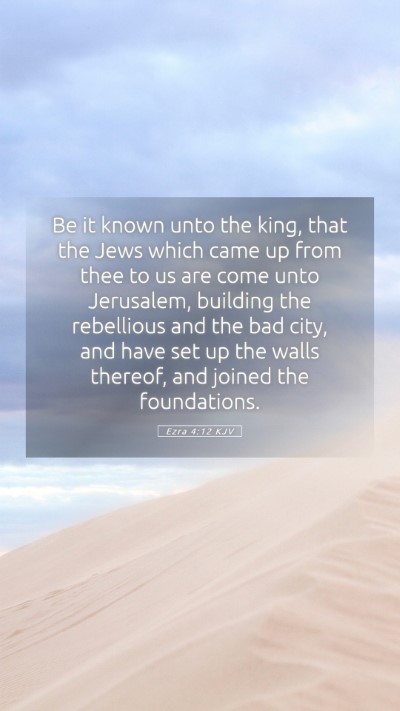Old Testament
Genesis Exodus Leviticus Numbers Deuteronomy Joshua Judges Ruth 1 Samuel 2 Samuel 1 Kings 2 Kings 1 Chronicles 2 Chronicles Ezra Nehemiah Esther Job Psalms Proverbs Ecclesiastes Song of Solomon Isaiah Jeremiah Lamentations Ezekiel Daniel Hosea Joel Amos Obadiah Jonah Micah Nahum Habakkuk Zephaniah Haggai Zechariah MalachiEzra 4:12 Meaning
What is the meaning of Ezra 4:12?
Be it known unto the king, that the Jews which came up from thee to us are come unto Jerusalem, building the rebellious and the bad city, and have set up the walls thereof, and joined the foundations.
Ezra 4:12 Bible Verse Meaning
Understanding Ezra 4:12
Bible Verse: Ezra 4:12 - "Be it known unto the king that the Jews which came up from thee to us are come unto Jerusalem, building the rebellious and the bad city, and have set up the walls thereof, and joined the foundations."
Summary of Scripture Meaning
This verse is part of a larger narrative in the Book of Ezra, which deals with the return of the Jewish exiles to Jerusalem after the Babylonian captivity. In this specific passage, adversaries of the Jews are writing to the king of Persia to inform him about the activities of the returning Jews and their efforts to rebuild Jerusalem.
Insights from Public Domain Commentaries
Matthew Henry's Commentary
Matthew Henry emphasizes the malicious intent of the accusers near Jerusalem. He points out that the Jews are portrayed as rebuilding a city labeled as "rebellious and bad." This reflects the enemies' attempts to undermine the Jews' work by framing it as a threat to the king's authority.
Albert Barnes' Notes
Albert Barnes remarks on the nature of the accusations presented to the king. He notes that the charges contain an element of exaggeration, aimed at provoking the king's wrath. The term "rebellious city" is significant, as it not only reflects the past of Jerusalem but also serves to incite fear regarding the present activities of the Jews.
Adam Clarke's Commentary
Adam Clarke offers a historical perspective, discussing the implications of the walls and foundations being rebuilt. He underscores how this act was perceived as a direct challenge to the authority of the Persian king, showcasing the tensions between local authorities and the returned Jewish exiles. Clarke highlights the importance of context in understanding the motivations behind these accusations.
Key Themes and Applications
- Resistance and Opposition: The verse illustrates the opposition faced by those seeking to restore their heritage. This dynamic is common in both biblical and contemporary contexts when undertaking significant projects or reforms.
- Perception versus Reality: The framing of Jerusalem as a "rebellious city" reflects how perceptions can distort reality. This concept invites reflection on how we might misinterpret others' actions based on past experiences and biases.
- Divine Providence: Despite the opposition, the continued efforts of the Jews to rebuild highlight the central theme of God's providence in the midst of challenges and adversities faced during their restoration process.
Historical Context and Relevance
The historical context surrounding Ezra 4:12 sheds light on the tumultuous climate during the rebuilding of Jerusalem. Understanding the geopolitical atmosphere is crucial for accurate biblical exegesis and offers insights into the struggles of the Jewish people during this era.
Cross References
- Nehemiah 2:19 - Opposition to Nehemiah's rebuilding efforts.
- Ezra 4:1-5 - The earlier efforts to hinder the rebuilding process.
- Isaiah 44:28 - Prophecy concerning the rebuilding of Jerusalem.
Conclusion
Ezra 4:12 serves as a reminder of the complexities involved in spiritual restoration and the challenges that arise from external adversities. For those engaged in Bible study insights and Scripture analysis, this verse offers rich material for exploring themes of resistance, perception, and divine guidance.


